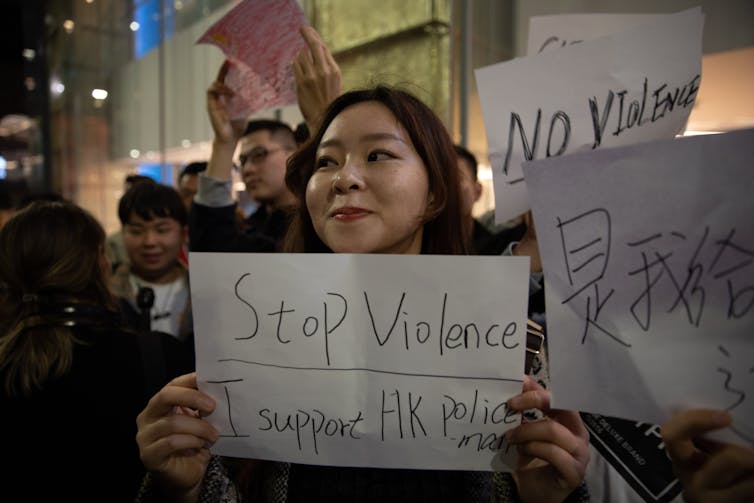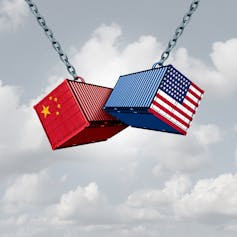Cultural sensitivity or censorship? Lecturers are finding it difficult to talk about China in class
- Written by Joyce Y.M. Nip, Associate professor, University of Sydney
Human Rights Watch released a report last week on the Chinese government’s surveillance of Chinese mainland and Hong Kong students in Australian universities. The report found students and academics critical of China’s Communist Party are being harassed and intimidated by supporters of Beijing.
Interviews with 24 pro-democracy students from mainland China and Hong Kong, and 22 academics at Australian universities, showed these students and academics had been self-censoring “to avoid threats, harassment, and surveillance”.
In our small closed-door discussion at the University of Sydney in June, arts and social sciences lecturers identified similar experiences.
Where ideological issues such as Hong Kong and Taiwan are concerned, lecturers told of how a vocal minority of international Chinese students are attempting to police teaching materials and class discussions. These students are pushing their classmates into self-imposed silence.
Lecturers are being challenged
Several lecturers reported they had been challenged by some students about teaching certain content and reading materials around China.
One lecturer talked of a discussion in an introductory liberal arts class. He had shown a breakdown of where the university’s students came from as part of a discussion about diversity. Later, the lecturer received an email from an international Chinese student. The student asserted Taiwan and Hong Kong were not individual state entities (as indicated on the demographic breakdown) but were part of China, and that the information needed to be corrected.
 Many people in Australia support China’s stance on Hong Kong and the controversy seeps through into university classrooms.
Shutterstock
Many people in Australia support China’s stance on Hong Kong and the controversy seeps through into university classrooms.
Shutterstock
Another lecturer in a business studies course was challenged in class by an international student after mentioning the COVID-19 pandemic originated from the Chinese city of Wuhan.
On another occasion, an international Chinese student in a Chinese media class used his presentation to read out what sounded like a declaration that Western media were biased against China, instead of addressing the presentation topic.
Lecturers and students are self-censoring
Faced with such challenges, one lecturer said she felt compelled to exclude controversial topics as, if they were raised, the short time of the class wouldn’t be enough for a productive discussion. This contrasts with the mid-2000s when she started teaching, at which time she said she had felt free to raise any issue for discussion in class.
Another lecturer said: “I just don’t talk about Taiwan anymore”.
Often, it is not the lecturer but the students who avoid ideological issues. A lecturer who teaches languages reported international students were inclined to self-silence for fear of repercussions.
Read more: Why the Australia-China relationship is unravelling faster than we could have imagined
On the other hand, lecturers reported students from English-speaking countries, including Australia, who would otherwise describe China as authoritarian with little respect for freedom or human rights, were shying away from ideological issues out of concern for offending other students.
Where does cultural sensitivity stop?
Before COVID, international education was Australia’s third largest export. Despite an overall drop in international university students in Australia due to COVID, the proportion of students from China actually increased slightly in January 2021 — from 38% in January 2020 to 39% of the international cohort.
The implications of the ideological rivalry we heard about, as well as what has been described in the Human Rights Watch report, on university education are concerning.
Sydney university lecturer in international relations, Dr Minglu Chen, has written on how teaching Chinese politics is becoming more challenging, and being squeezed between the opposing ideologies of students. She wrote:
[…] if students come to class with pre-existing rigid mindsets and refuse to engage with different opinions and viewpoints, then education simply fails in its purpose.
In a globalised world where cultures meet, educators are expected to be culturally sensitive and inclusive, but at what cost? Are we to exclude topics and perspectives in our teaching because they may offend the sensitivity of some of our students?
When does cultural sensitivity stop and self-censorship start?
We need to uphold the values of academic freedom and inquiry that are central to a university education. Universities must be a safe space for ideologically charged issues to be discussed freely, logically and critically with an open mind based on facts not emotions. We can’t let them be uncomfortably passed over, vaguely alluded to or outright avoided.
Ideological difference is, of course, only one of the many layers of cultural difference that exist between students of varied backgrounds. Language, learning styles and preferences, interests and lifestyle are some others. But it is a strong layer that can keep people apart.
 Students can have some meaningful discussions and acknowledge faults on both sides.
Shutterstock
Students can have some meaningful discussions and acknowledge faults on both sides.
Shutterstock
This being said, there are also, of course, positive experiences in the classroom.
We can meet the challenge
In the closed-room discussion, one lecturer talked of a postgraduate class on film theory, in which 70% of students are from mainland China. Many students said the class provided them with a space to articulate their personal and political views on gender, sexuality and, more broadly, identity, which they said are considered “antiestablishment” in China.
In another class on news reading, international Chinese students were assigned the task of role playing the American figure while others played the Chinese figure in a propaganda animation produced by the People’s Republic of China about the handling of the COVID-19 pandemic. Students agreed both China and the United States had made mistakes, and that one’s wrongs did not make the other side right.
While Australia faces the challenge in teaching classes with a large share of international students from China, lecturers also have a unique opportunity to find innovative ways to meet the challenge.
Before anything else though, we need to go beyond anecdotal evidence to understand how students perceive ideological discourses, and how they position themselves in relation to the ideology of their political authorities. Research like this can then become the foundation for designing a non-discriminatory and critical learning environment. This will help to mitigate the influence of ideological discourses.
Authors: Joyce Y.M. Nip, Associate professor, University of Sydney





